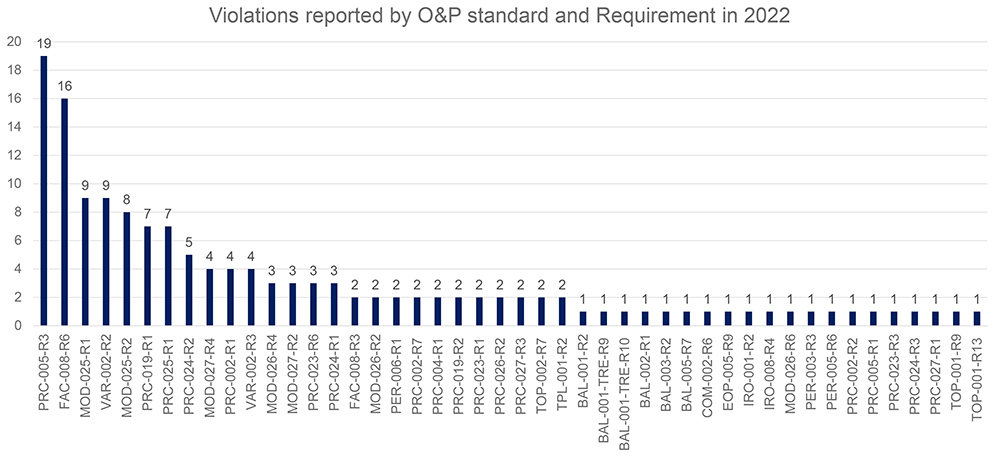
It should be “no surprise” that PRC-005-6 (Protection system, automatic reclosing, and sudden pressure relaying maintenance) and FAC-008-5 (Facility ratings) were the most violated operation and planning standards in SERC’s footprint last year, senior compliance engineer Miles Albritton told SERC Reliability’s Operation and Planning Spring Reliability Webinar Tuesday.
“With literally tens of thousands of devices in the field that require an inspection once a month, once a quarter, [or] annually … there are going to be some missing. However, with the right tools in place you can reduce the number of these misses,” Albritton said about the PRC-005-6 violations. Requirement R3 of the standard, which requires transmission owners, generator owners, and distribution providers to follow minimum maintenance schedules for certain equipment, accounted for 19 of the standard’s 20 violations in 2022.
“The same is true with FAC-008-5,” where the most violated requirement was R6, which directs transmission owners and generator owners to have facility ratings that are consistent with an established methodology, he said. “There are tens of thousands of elements in the field that have facility ratings, and these facility ratings can easily get altered, especially during restoration after a winter or summer storm. … As we all know, there are lots of opportunities for failure.”
 Requirement R3 of PRC-005-6 accounted for all but one violation of the standard in 2022, with the last attributed to Requirement R1. | SERC
Requirement R3 of PRC-005-6 accounted for all but one violation of the standard in 2022, with the last attributed to Requirement R1. | SERC
SERC holds the O&P webinar each spring to give staff at registered entities a chance to discuss recent changes in NERC’s reliability standards and trends the regional entity has seen in its audits in the past year. While the event included discussions on improving entities’ compliance with standards, presenters emphasized that the goal was to encourage entities to go beyond the bare minimum and develop a robust security culture.
“No one really gets up and says, ‘I’m going to be compliant today!’” said Tim Ponseti, SERC’s vice president of operations. “But you do get up and get excited about being safe, about being reliable, about being secure.”
Albritton acknowledged that SERC recorded violations of a “cornucopia” of standards last year but said PRC-005-6 and FAC-008-5 stood out. The first because it and its predecessors have been the most-violated standards over the last five years, and the second because it was the subject of an “influx of self-reports … across the entire ERO footprint” in 2022.
Violations of PRC-005-6 are frequently associated with failures of battery maintenance, with Albritton pointing to “simple [actions] like checking the electrolyte levels or checking for unintentional grounds” that are “easily fixed with a secondary peer review.” Albritton said the primary causes for FAC-008-5 violations are lack of internal controls, an “insufficient change management process, and training, not only for the field but for everybody in the change management process.”
“Change management internal controls are your friend. Many PRC-005, PRC-023, [and] FAC-008 noncompliances could be prevented with good … internal controls,” Albritton said. “Remember to test and audit the effectiveness of your internal controls; don’t just implement them and leave them on cruise control. You have to be able to test them on a periodic basis to make sure that they are still functioning.”



